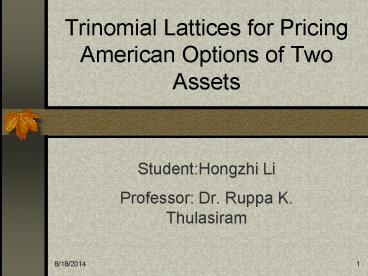Trinomial Lattices for Pricing American Options of Two Assets
Title:
Trinomial Lattices for Pricing American Options of Two Assets
Description:
Title: Trinomial Lattices for Pricing American Options of Two Assets Last modified by: lhz Document presentation format: On-screen Show Other titles –
Number of Views:138
Avg rating:3.0/5.0
Title: Trinomial Lattices for Pricing American Options of Two Assets
1
Trinomial Lattices for Pricing American Options
of Two Assets
- StudentHongzhi Li
- Professor Dr. Ruppa K. Thulasiram
2
Overview of Presentation
- Introduction and Motivation
- Related work
- Problem statement
- Solution
- Results
- Conclusions and Future Work
3
Introduction and Motivation
- The American-style option pricing is an important
topic because most publicly traded options are
American styles. In the American option, a put or
call can be exercised at any time until maturity. - With the accelerated cross-market integration and
greater globalization of finance, investors have
been more and more interested in options of
multi-assets. - The options of multi-assets can give investors
more help on risk management. - Correlation risk is very hard to risk manage. The
option based on multi-assets enables to lock up
the implied correlation among the multi-assets.
4
Related work
- The first paper to examine this type of option
was Stulz 1, who derived formulas for calls and
puts that pay off based on which of two assets
has the maximum or minimum value. - Johnson 2 develops the formula under the
condition of more than two assets based on Stulz
basic formula.
5
Problem Statement
- With growth of stock markets, it is common that
an investor have more than one asset in ones
hands. - The risk management of options of multi-assets is
a very important topic in the real market. In
this project, we concern about pricing the
American option value based on two underlying
assets. - In this project, we use trinomial tree method to
value this kind American option. The one assets
values are affected by the other assets.
6
Problem statement Cont
Level 0 1 2
Level 0 1 2
(2,0)
(2,0)
(2,1)
(2,1)
(2,2)
(2,2)
(0,0)
(0,0)
(2,3)
(2,3)
Asset1
Asset2
(2,4)
(2,4)
Si,jT1
Si,jT2
Si,jT2 Si,jT1 (0.95-(j mod 3)0.05)
7
Solution
- The trinomial tree method is proposed by Boyle
3 in 1988. - We use trinomial tree to value American
options,because The trinomial model is more
accurate than the binomial model. - When we value the American option based on two
assets, we are based on an important assumption
that two assets have same expiration time 4.
Hence, the two trees have the same structure.
8
Solution Cont
- Suppose Pu, Pm, and Pd are probabilities of up,
middle, and down movements at each node and ?t is
the length of the time step. ? is volatility. For
a non-dividend back stock, the parameters can be
calculated by the following formulas 5.
9
Solution Cont
1) Time step N2, the number of node at any level
i is 2i1
Level 0 1 2
(2,0)
(2,1)
2)A node in the tree is indexed by a pair (i, j),
where i indicates the level and j the distance
from the top.
(2,2)
(0,0)
(2,3)
3) The option price and the asset price at node
(i, j) are given by Ci, j Ci,j and Si, j
S i,j respectively.
(2,4)
10
Solution Cont
- 1) Construct a normal trinomial tree based on the
first asset and compute the option value. - 2) The each node value of second tree is not
calculated from trinomial mode, but from the
corresponding nodes value of first one. The
payoff of the second tree is computed following
the trinomial model formula. - 3) The final option is the average of both first
asset and second asset option values.
11
Results
American Put Option
American Call Option
12
Conclusions and Future Works
- This project proposes the trinomial tree method
to lock up the implied correlation among the two
assets - One option depending on two assets can help
investors to manage the risk on their investments
efficiently because the options make products
competitive. - The trinomial tree method is a time consuming
approach. Hence, the future work is to use
parallel computing techniques to reduce the
computing time of trinomial tree.
13
References
- 1 R.M. Stulz. Options on the maximum or the
minimum of two risky assets. Journal of Financial
Economics,10161-185,1982. - 2 H. Johnson. Options on the maximum or the
minimum of several assets. Journal of Financial
Quantitative Analysis, 22277-283,1987. - 3 P. P Boyle. Option Valuation Using a
Three-Jump Process. International Options
Journal,3229-263,1988. - 4 Ruppa K. Thulasiram, and Dmitri Bondarenko "
Performance Evaluation of Parallel Algorithms for
Pricing Multidimensional Financial Derivatives ",
Parallel and Distributed Computing Practices,
Journal (Accepted). - 5 Cox, J. and M. Rubinstein (1985). Options
Markets. Prentice Hall, Englewood Cliffs, NJ.































